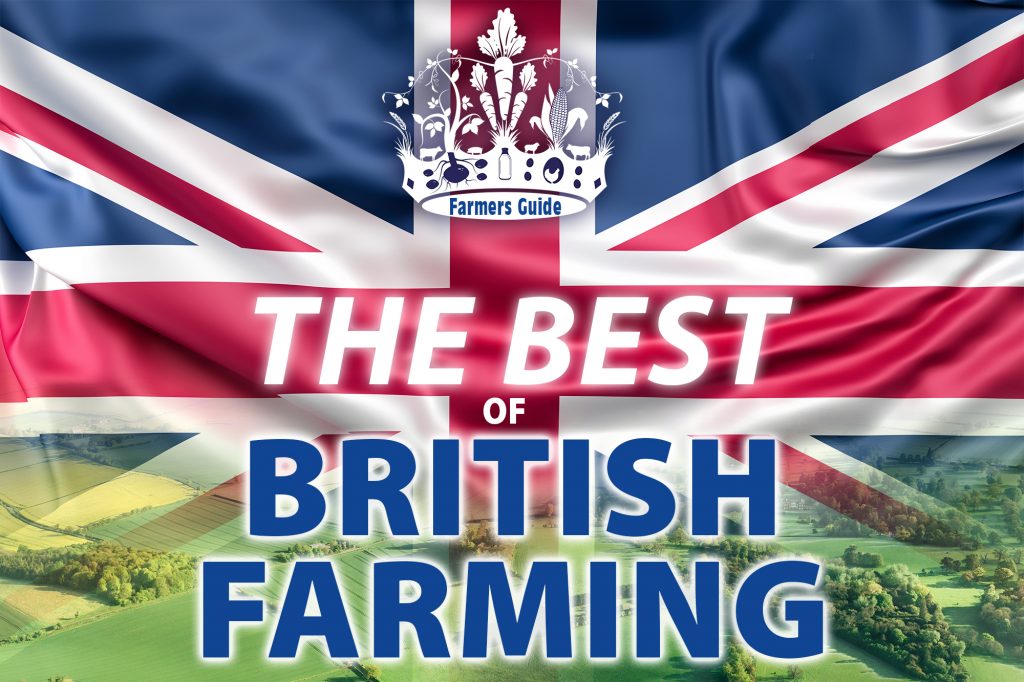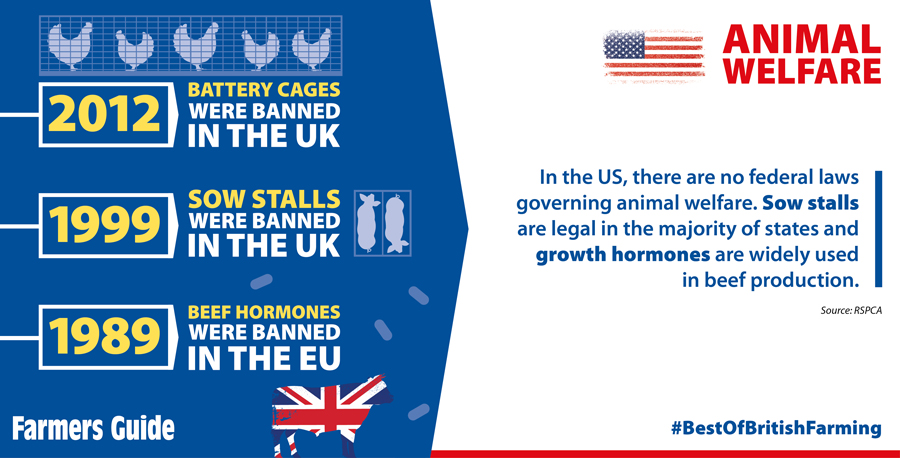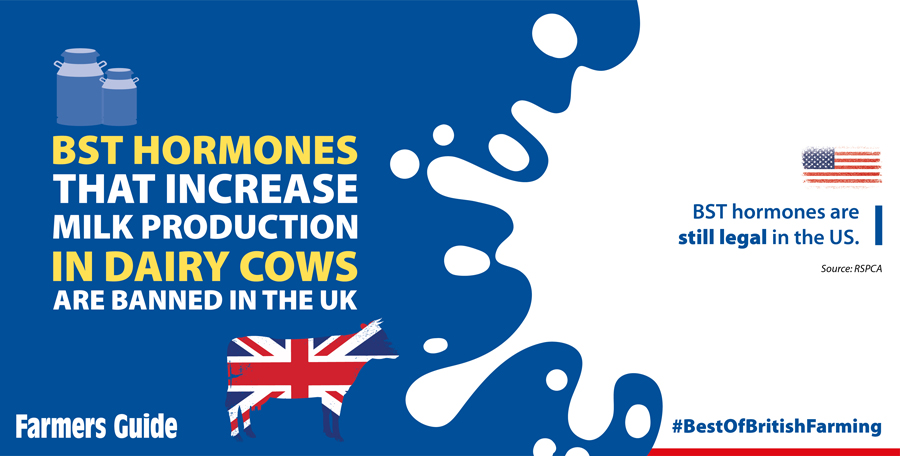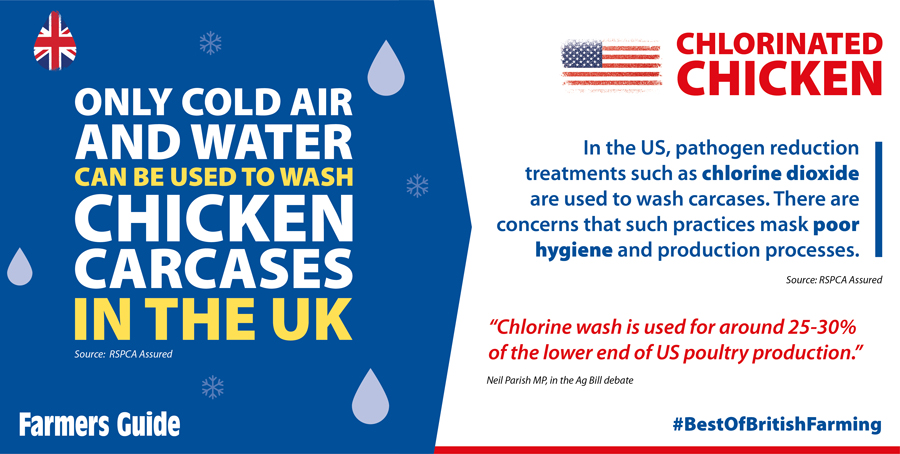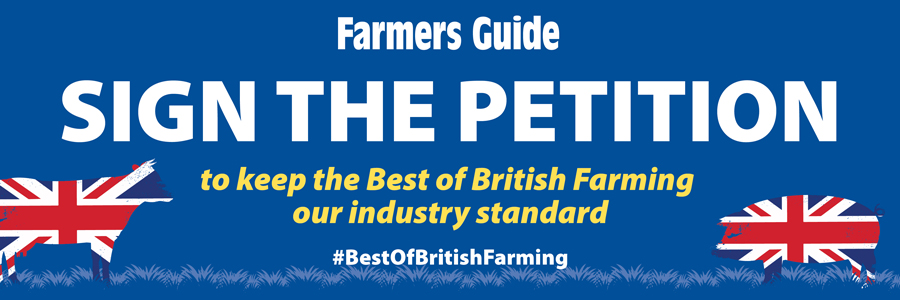Ag Bill: We must stand up for British farming
4th June 2020
British food, farming and animal welfare standards are among the best in the world, and we are right to be proud of them. Sign the petition to protect our industry from lower standard imports.
British food, farming and animal welfare standards are among the best in the world, and we are right to be proud of them. In the midst of the Covid-19 pandemic, the importance of healthy local food has perhaps not been so appreciated since the Second World War – and while our lives may be unrecognisable since the pandemic, our farmers are still out, working hard to feed the nation in spite of numerous challenges.
For many, local farmers and farm shops have been a lifeline when the supermarket shelves were bare. And yet, despite these efforts, farmers could be facing another challenge as the government recently voted against measures to protect the industry from lower standard imports – a move which has prompted dismay, not only among farmers but animal welfare organisations, environmentalists, vets, MPs and even TV chef Jamie Oliver.
In the current crisis, Brexit seems an almost distant memory but the wheels are still turning, and the Agriculture Bill has now passed to the House of Lords. While the government has often promised to prevent imports of food that would be illegal to produce here, this has not yet been enshrined in law and a recent debate in the House of Commons saw Neil Parish MP table an amendment that would have prevented such imports. Despite much cross-party support, it was voted down by a margin of 51 votes.
There has been a great deal of concern that future trade deals – for example with the US – could see products including chlorinated chicken, hormone-injected beef and eggs from battery caged hens, making their way onto our supermarket shelves. As these products are far cheaper to produce, they could undercut British farmers who have to adhere to much higher standards.
So, what does this mean for agriculture, and should we be worried?
Having spent decades working hard to improve food safety, animal welfare and antibiotic use, whilst lowering our impact on the environment, it is no surprise that the prospect of cheaper, lower quality imports are a source of huge concern.
Battery cages were banned in the UK in 2012, sow stalls in 1999 and growth hormones for beef across the EU in 1989. Antibiotic sales for livestock were cut by an impressive 53 per cent between 2014 and 2018 and only cold air and water can be used to wash chicken carcases.
Meanwhile in the US, there are no federal laws on animal welfare, sow stalls are legal in major pig producing states and growth hormones are widely used in beef production. Pathogen-reduction treatments such as chlorine dioxide are used to wash carcases for around 25-30 per cent of US poultry production at the lower end. BST hormones, which increase milk production in dairy cows, are also banned in the UK but remain legal in the US. The use of ractopamine (which promotes lean meat growth), again is still allowed in US pig production, but banned in the UK. This is without mentioning the stringent rules on space and enrichment, for example, that British farmers adhere to. US arable farmers also have access to numerous pesticides that UK farmers are not allowed to use.
The National Beef Association’s CEO Neil Shand has said the organisation is most troubled by the lack of provision in the Bill for food security and standards. “Food security – or the lack of it – has been harshly exposed in the current pandemic, and we are gravely concerned that there has been no food security study carried out by the Government prior to the introduction of the new Agriculture Bill.
“UK food standards, especially in regard to welfare and traceability of beef, are world class. Our rigorous system ensures that British beef is sourced from farms which have a responsibility both to the welfare of the animal, and to the documentation and recording of medication administered to that animal. Imported cheaper beef may not have the same governance of welfare and transparency, and clear labelling is imperative to ensure the consumer is aware of the choice they are making.”
Backing British farmers
Discussions over the Ag Bill have seen everyone from animal welfare and environmental groups to MPs, farming groups and vets speaking out in support of British farmers, and urging the government to reconsider its stance. The recent debate in the Commons saw a number of cross-party MPs give impassioned speeches backing British farmers.
Neil Parish MP, who tabled the amendment, said: “Let us not be frightened of putting clauses into the Bill that protect us, with the great environmental and welfare standards that we want the whole Bill to have, and that farmers want to have…
“I want great trade deals. I am not a little Englander who will defend our agriculture against all imports—quite the reverse. I think competition is good, but on a level playing field that allows us to produce great food and allows our consumers to have great food, and makes sure that we deliver good agriculture and environment for the future.”
MP for North Dorset Simon Hoare, who opened the debate, said we should “shun” cheap, poor quality imports and instead be “a beacon for excellence and high standards”. Similarly, Luke Pollard MP added: “What kind of country do we want to be—one where farm standards are a pawn in a trade deal with our values traded for market access, or a nation that says Britain is a force for good in the world and upholds our high standards for food grown locally and food imported alike? At a time of climate crisis, we must choose to rebuild a better, greener, more sustainable and fairer Britain than we had before.”
Deidre Brock, MP for Edinburgh North and Leith, spoke with similar anger at the prospect of lower standard imports: “Save our farmers, save our cooking and save our families… Do not dump rubbish in our kitchens and on our plates. Let us have standards on imported food that are as high as the standards on food produced on these islands. I noted the Minister’s commitment in her speech to maintaining those standards, but I cannot understand why it is not on the face of the Bill.”
Some MPs, however, argued that accepting the amendment would make it difficult for the UK to make trade deals with other countries, while others said the Trade Bill was a more appropriate place for such a clause.
Many organisations outside of farming have voiced their concerns about the impact of lower standards foods on British farmers, including the RSPCA, RSPB, the Wildlife Trust and the Woodland Trust. The British Veterinary Association was among the veterinary organisations to stand up for farmers: “We stand with the farming community in questioning how the government now intends to honour its manifesto commitment to maintain and enhance animal welfare standards.”
Many organisations are now urging the House of Lords to reject the un-amended Bill and send it back to the Commons.
Support for farmers also appears to be growing among consumers and supermarkets, with a recent trend for announcing measures backing British food. The Co-op recently upped its supply of steak by 40 per cent across its stores, while Morrisons reopened steak and seafood bars and offered its farmers a 5 per cent discount on shopping. M&S launched a six-week campaign to support British farmers and continued to guarantee a leading and fair price for milk.
Jamie Oliver also penned an open letter to the Prime Minister, published in the Mail on Sunday, where he warns:
‘We could be about to open the floodgates to a whole raft of low-quality food that would normally be illegal in the UK. Chlorinated chicken is just the tip of the iceberg. We’re talking about genetically modified food, stuffing animals full of hormones and antibiotics, banned pesticides that kill our bees, and an avalanche of foods that are high in fat, salt and sugar.
‘What’s more, we’ll be threatening the future of our farmers and food producers who, despite extraordinary challenges, have worked so hard to keep us fed throughout the Covid-19 crisis.’
Talk of lower standard food imports begs the question, would consumers buy these products if they were available? Research carried out last year by ComRes, on behalf of the Guide of Agricultural Journalists, found that 84 per cent of the public who responded believed imports should match British standards. Around one in six (16 per cent) said they would buy food that they knew was produced to lower animal welfare standards, if it was cheaper. Meanwhile an RSPCA poll found that 67 per cent of people are concerned that cheap imports of lower welfare products could seriously undermine UK standards.
It may also be worth noting a change in some consumer habits in the current situation. If there are any positives to be found in the Covid-19 pandemic – and it can be hard to find a silver lining – it is that the value of local British food is more appreciated than ever. With the vegan movement gaining traction in recent years, and a decline in the understanding of where food comes from, it is fair to say that the farming industry was under-appreciated by many. Though it is saddening that it took a global pandemic for local food to be appreciated, many farm shops are now reporting booming sales. Consumers appear to be looking for an easier, safer solution to shopping for fresh food, as delivery or click and collect slots remain few and far between. Heath Farm in Suffolk says its sales have increased five-fold since the pandemic.
Lockdown has also offered valuable opportunities for children to learn more about where their food comes from, and many farms have used YouTube videos to offer a countryside classroom.
What does the future hold?
Although there has been a clear and welcome boost in support for British farmers, and despite assurances from the government that lower standard imports will not be allowed, there was clear disquiet among many MPs that this pledge has not been included in the Bill. It was evident in the debate that many MPs felt that verbal assurances are simply not enough. Our agricultural sector is something to be proud of and our standards are worth fighting for. As a society we all have a role to play in standing up for British farming and it appears that many sectors are backing British farmers.
To sign the petition calling on the government to send the Ag Bill back to the House of Commons for amendment, visit HERE.
